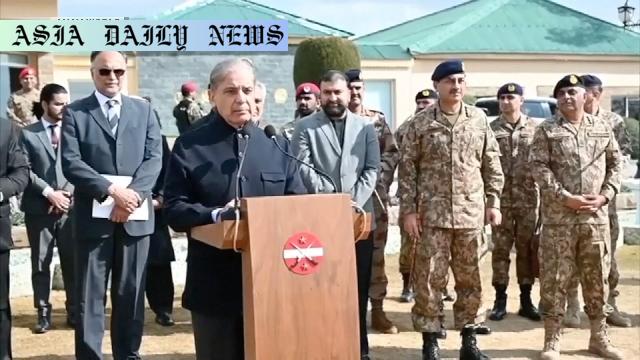Balochistan – Pakistani PM visits Quetta after insurgents’ deadly train hijack, pledging unity to fight terrorism.
- Balochistan province witnessed a tragic train hijacking by the Baloch Liberation Army (BLA).
- Pakistan’s Prime Minister emphasized unity to combat terrorism in the wake of the incident.
- Over 25 individuals lost their lives, including hostages and security personnel.
- Balochistan houses key mineral resources and faces frequent attacks from insurgent groups like the BLA.

Introduction: The Devastating Attack in Balochistan
Balochistan, a mineral-rich province in Pakistan, witnessed a tragic and violent incident this past week after insurgents hijacked a train carrying over 400 passengers. The Baloch Liberation Army (BLA), an anti-government armed group opposing federal infrastructure development projects, claimed responsibility for the attack. This hijack resulted in over 25 fatalities, including 21 hostages and four security personnel, after a military-led rescue operation. Amid the fallout, Pakistani Prime Minister Shehbaz Sharif emphasized the importance of national unity and pledged an unyielding fight against terrorism during his visit to Quetta, the provincial capital.
Details of the Tragic Incident
The train, targeted on Tuesday, was traveling through Balochistan, carrying passengers unaware of the imminent danger. The insurgents hijacked the train amidst gunfire, which escalated into chaos. Tragically, 21 hostages lost their lives in the standoff, alongside the deaths of four valiant security personnel. This incident highlights the ongoing terrorist activity present in the province, which has long posed challenges for both local governments and the military. The military’s rescue operation, though courageous, underscores the difficulties in countering such insurgent attacks in remote territories.
Prime Minister’s Visit and the Call for Unity
Prime Minister Sharif and his cabinet members arrived in Quetta on Thursday to assess the security measures in place and to receive detailed briefings from local authorities. During his remarks, Sharif stressed the importance of unity and determination in combating terrorism. “Our armed forces are capable of crushing these terrorists with full force,” he reassured the nation, adding that achieving this goal requires national cooperation and solidarity. The Prime Minister’s commitment reflects his government’s desire to strengthen security efforts and ensure that such an incident does not occur again.
The Underlying Conflict: Baloch Liberation Army’s Agenda
The Baloch Liberation Army, known for its operations against infrastructure projects involving foreign investments, particularly China’s Belt and Road Initiative (BRI) projects, has claimed responsibility for numerous attacks in the region. Balochistan’s infrastructure and mineral wealth have put it at the center of economic projects designed to boost national and regional development. However, BLA militancy opposes these projects, arguing they exploit local communities while providing limited benefits to the province itself. This hijacking and other attacks illustrate growing tensions in Balochistan, complicating efforts by both Pakistani authorities and foreign investors to cultivate stability and industrial growth.
Conclusion: Striving for Stability in Balochistan
The tragic train hijack in Balochistan is a somber reminder of the volatility in the province. It underscores the urgent need for comprehensive measures to counteract insurgent threats while pursuing development projects responsibly. Prime Minister Sharif’s visit and his call for unity signal the government’s determination to address terrorism, but it will take collaborative efforts, both within the political spectrum and outside of it, to bring lasting stability to Balochistan. As the government navigates these sensitive issues, the safety and welfare of local communities must remain at the forefront of national priorities.



Commentary
Balochistan: A Region in Peril
The train hijacking in Balochistan represents more than just a tragic act of terrorism; it is emblematic of the longstanding strife and instability afflicting the region. Balochistan’s wealth of natural resources has made it a focal point of economic development and foreign investments, yet this has also fueled resentment among locals who feel marginalized and exploited. The involvement of insurgent groups like the Baloch Liberation Army complicates the government’s efforts to modernize and integrate the region.
The Role of Government and Military
Prime Minister Sharif’s visit to Balochistan, while commendable, underscores the immense responsibilities of the Pakistani government and military. Mitigating risks posed by insurgents requires not only enhanced military strategies but also addressing the root causes of dissent. Inclusive development, transparency in projects, and dialogue with local stakeholders must complement counterterrorism operations to achieve sustainable peace in the region. Sharif’s message of unity is vital, yet it must translate into tangible initiatives that resonate with the people of Balochistan.
International Implications
The frequent attacks in Balochistan also carry international ramifications, particularly given the involvement of China in the region’s development. The China-Pakistan Economic Corridor (CPEC) and other projects under the Belt and Road Initiative are critical components of Pakistan’s economic vision. However, such instability can deter foreign investments and strain diplomatic relations. Addressing security concerns in Balochistan is thus pivotal not only for Pakistan’s internal stability but also for its global economic and political positioning.
Final Thoughts
The incident in Balochistan calls for resolute action and long-term strategies by both the government and international stakeholders. While strengthening security forces is essential, adopting inclusive policies that consider the needs and aspirations of the local population will be key to preventing similar tragedies in the future. This approach will not only address Balochistan’s volatile security environment but also pave the way for its progress and development as a stable and thriving region in Pakistan.